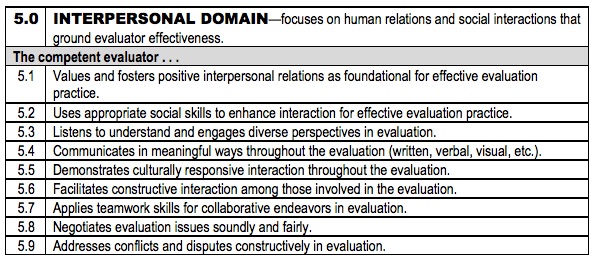*AEA365 Curator Note: My apologies to aea365 subscribers! Some of this week’s posts did not go out via email to our subscribers. Please read this post on the site itself (http://aea365.org/blog/), and be sure to scroll back to the first post of this series on December 4 in order to enjoy and learn about the overview and history of the Competency Task force and all of the domains!
This is Hazel Symonette, University of Wisconsin, and Sandra Ayoo, University of Minnesota, members of AEA’s Competencies Task Force. Today we are presenting the competencies from the fifth and final domain: the 2/24/16 DRAFT Interpersonal Domain. Remember that this is the central question guiding our task force: “What is fundamental to the practice of evaluators?” Given AEA’s Guiding Principles, it is difficult to imagine a skill set more fundamental to evaluation practice than people skills. Interpersonal competencies revolve around how we relate to and engage others. These foundational competencies focus on an evaluator’s interactions with the full spectrum of relevant stakeholders, in particular, culturally and contextually appropriate and responsive communications and social relations. Such considerations are especially crucial in choosing and activating appropriate protocols for establishing and sustaining rapport, for negotiation, and for conflict transformation.
Ongoing Issues: Our Task Force continues to work through how to best incorporate culture, social justice and power/privilege considerations. We are striving to integrate cultural considerations across domains given their centrality to evaluation practice. Similar to the most recent revision of the Program Evaluation Standards, we have explicitly attended to culture in these domains: Professional 1.2, Methodology 2.2, Context 3.3, and Interpersonal 5.5.
Social justice considerations are more challenging because some evaluators foreground and embrace these issues while others may question the relevance of including this language. Such considerations revolve around how evaluators appropriately AND effectively engage their understandings of context and power differences—notably, privileging and marginalizing structures and dynamics. How do we equitably engage and “distribute” the voice and involvement opportunities, resources, and burdens associated with evaluation processes, protocols, and products? Our work continues. . .
Get Involved: The Task Force continues to seek input as we update this draft for final review and AEA Board approval and for voting by the AEA membership. Please share your thoughts now on the AEA homepage (www.eval.org). Your voice matters!
The American Evaluation Association is celebrating AEA’s Competencies Task Force week. The contributions all this week to aea365 come from members of AEA’s Competencies Task Force. Do you have questions, concerns, kudos, or content to extend this aea365 contribution? Please add them in the comments section for this post on the aea365 webpage so that we may enrich our community of practice. Would you like to submit an aea365 Tip? Please send a note of interest to aea365@eval.org. aea365 is sponsored by the American Evaluation Association and provides a Tip-a-Day by and for evaluators.

